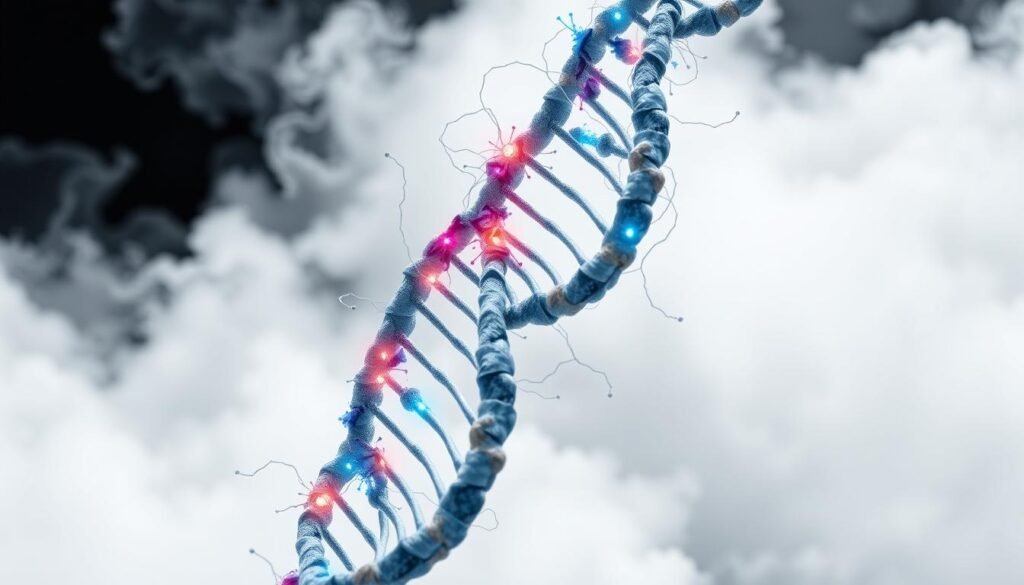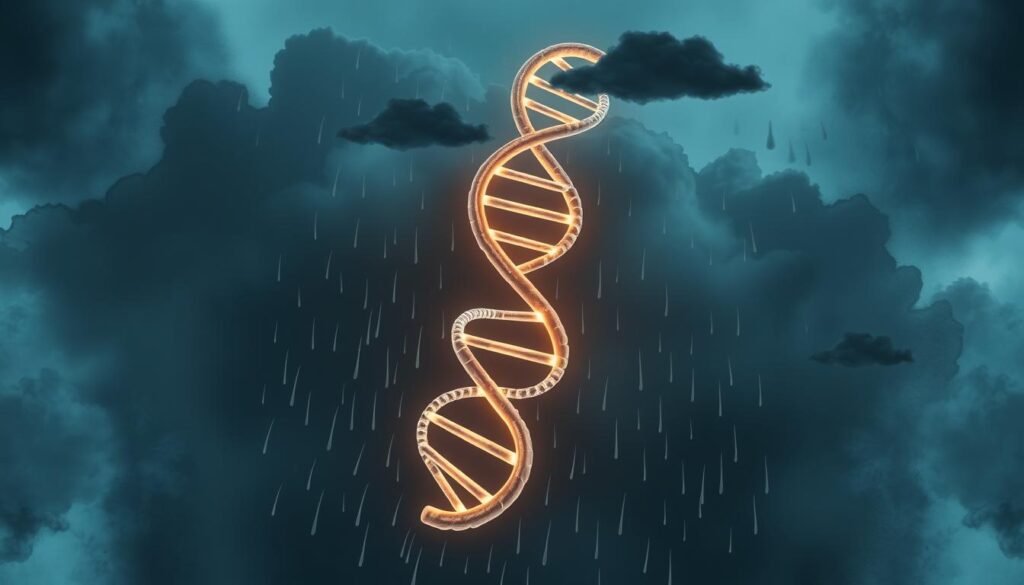At least 10% of people in the U.S. will face major depressive disorder (MDD) in their lifetime. This serious mental health issue leads us to wonder about its causes, especially genetics. Can depression be inherited? Studies show that those with depression in their family are 2-3 times more likely to get it themselves. This fact affects over 19 million American adults. So, it’s key to understand how genes and environment work together in depression.
Key Takeaways
- Major depressive disorder affects at least 10% of the U.S. population.
- Heritability estimates for depression range from 40-50%.
- Individuals with a first-degree relative who has depression face a 2-3 times higher risk.
- Genetic changes can contribute to both depression and anxiety disorders.
- Environmental factors also play a significant role in developing depression.
Understanding Depression
Depression is more than feeling sad. It includes feeling empty and not enjoying things you once did. People might eat more or less and have trouble sleeping. They might also feel tired all the time and have trouble thinking.
Depression is serious and needs attention. If symptoms last more than two weeks, it could be major depressive disorder. This usually starts in the teen years or early twenties. Without treatment, it can get worse and come back often.
Many things can increase the chance of getting depressed. These include family mental health history and going through tough experiences. About 350 million people worldwide have depression. This shows how common it is.
But, there are ways to deal with depression. Getting support, making lifestyle changes, and practicing mindfulness helps. These can all improve mental health.
Genetic Influence on Depression
The study of genetics has opened new doors in understanding depression. It shows that our genes can influence the risk of depression. Through family and twin studies, we’ve learned that genetics plays a key role.
What the Research Shows
About 300 million people worldwide suffer from depression. It’s the most common mental health issue. The heritability of depression is estimated to be 40-50%. This suggests genetics significantly influence its onset. A large study found 102 gene variants linked to depression among over 1.2 million people. These discoveries shed light on how genetics and depression are connected.
Importance of Family Studies
Family studies have shed light on how depression can run in families. If depression is in your family, your risk is two to three times higher. This emphasizes the need to look at family history. Discovering gene links to depression underlines the importance of further genetic research. This will help us create better treatments. For more information, see this study.
The Role of Genetics in Depression: Is It Hereditary?
Genetics help us understand why some people might get depression. It plays a big role in the risk of getting this condition. Studies with twins have shown a lot about how depression can be inherited.
Heritability Estimates of Depression
Genetics can explain about 40% to 50% of depression cases. This means if depression runs in your family, you’re more likely to get it. Research found that kids with parents who have depression are more likely to face it too. This shows a strong genetic connection to depression.
Identical vs. Fraternal Twins Studies
Studies with twins tell us a lot about genetics and depression. Identical twins, who share all their genes, are more likely to both have depression than fraternal twins. If one identical twin has depression, the chance the other one will too is 70%. This shows that genes play a big part in getting depression.
| Study Type | Concordance Rate | Heritability Estimate |
|---|---|---|
| Identical Twins | 70% | 40%-50% |
| Fraternal Twins | 20%-30% | Lower than identical twins |
| Adopted Individuals | High risk if biological parent had depression | Emphasizes environmental interplay |
This table shows important results from twin studies. It makes it clear that genes and family history are big factors in depression. Knowing about the genetic links can help create better treatment and support for people with depression.
Non-Genetic Factors Contributing to Depression
While genetics plays a big role in mental health, other factors also matter a lot. These include experiences and conditions that affect someone’s emotions deeply. They increase the risk of depression.
Bad experiences in childhood, like trauma or neglect, can leave a mark. They might lead to depression when one gets older. Life stresses, such as losing a job or a loved one, can make people feel hopeless. Also, dealing with long-term illness or pain can push someone towards depression.
It’s also important to consider how our environment plays a role. Feeling alone because of social isolation can lead to depression. Being out of work can stress someone out and make them feel bad about themselves. Having trouble in relationships, whether with family, friends, or partners, can shake one’s emotional balance.
| Non-Genetic Factors | Impact on Mental Health |
|---|---|
| Adverse Childhood Experiences | Increased risk of long-term depression and anxiety |
| Severe Life Stress | Leads to feelings of hopelessness and despair |
| Physical Health Issues | Contributes to emotional struggles and depressive symptoms |
| Social Isolation | Results in feelings of loneliness and increased depression risk |
| Unemployment | Brings financial strain and diminished self-esteem |
| Relationship Difficulties | Affects emotional stability and overall mental health |

Family History and Its Impact on Depression Risk
Depression and family history are closely linked. Hereditary factors can affect your chance of getting depression. If a parent or sibling has it, you’re at greater risk. Studies say your risk is two to three times higher. About 20-30% of these folks might struggle with depression themselves.
Increased Risk for Close Relatives
Knowing your family history is key in figuring out your risk. If immediate family members have depression, your chances go up. Here’s how family ties can increase that risk:
- Having a parent or sibling with major depression raises your risk a lot.
- If your family member has recurring depression, your risk could jump four to five times.
- Those with relatives who have bipolar disorder also face higher risks. It shows shared genetic risks.
Age of Onset and Heredity
How early depression starts can tell us about family history’s role. Depression starting in childhood or adolescence means a higher risk for relatives. It often shows a strong genetic link. Knowing your family’s medical history is crucial here. Early depression in relatives points to a significant genetic influence. This can affect how the brain works in various ways.
Familiar patterns of depression show how important genetics are. They also highlight the need to be aware to prevent and tackle this issue. Studies are digging into genetic factors tied to family history. These studies help ongoing research. For more details, check out this link.
Genetic Variations and Depression
Studying genetic variations gives us key insight into their role in mental health, especially depression. Research has shown that many genes combine their minor effects to influence depression risk. This makes the genetic landscape of depression complex, posing challenges in identifying specific genes.
Complexity of Genetic Involvement
Genome-wide association studies, or GWAS, have found many genes linked to major depressive disorder (MDD). One big study with about 1.2 million people found 178 genetic areas and 223 significant single-nucleotide polymorphisms (SNPs). These findings show the complexity of genetics in mental health. They help explain why depression symptoms vary among people.
The way studies choose participants can affect the reliability of their findings. Many use self-reports or basic checks, possibly including those who don’t actually meet MDD criteria. This situation underscores the need for thorough evaluation techniques.
Research also indicates a link between genetic risk for mental disorders and sensitivity to stress from the environment. In essence, people with certain genetic variations might react more strongly to stressful life events. This affects their mental health. Studying these genetic factors sheds light on depression’s complex nature. Check out more on genetic clues to depression.

Types of Depression and Their Genetic Links
Research shows that different types of depression have genetic connections. Both major depressive disorder and bipolar disorder have strong genetic bases. They show how family history can increase the risk of these conditions.
Having family members with bipolar disorder means a higher chance of experiencing both major depressive and bipolar disorders. This reveals the deep links between mood disorders. Genetic connections in mood disorders are key to understanding mental health heredity.
Major Depressive Disorder vs. Bipolar Disorder
Major depressive disorder involves intense depression that makes daily life tough. Bipolar disorder, on the other hand, causes mood swings from depression to mania. Genetics play a crucial role in both.
About half the risk for these conditions comes from genetic factors. Knowing these genetic links helps in finding and helping those affected.
Depression and Anxiety Disorders
Depression and anxiety are closely linked, too. People with anxiety often are diagnosed with major depressive disorder. They share genetic risks.
This means having anxiety in the family may increase your depression risk. It highlights the need to consider both mood and anxiety disorders in diagnosis and treatment.
What We Know About the “Depression Gene”
The search for a “depression gene” has revealed a complex network of many genes. Studies suggest that genes account for about 40 percent of depression risk. This means people with depressed relatives are two to three times more likely to develop depression themselves.
Researchers have found 178 gene variants that link to depression. This shows how various genetic factors come together. For instance, one study highlighted a specific chromosome area connected to severe depression in families. Also, the SERT gene interacts with stress, affecting depression risk. This shows how genes and environment work together.
However, we can’t ignore the role of the environment in depression. Things like stress and how we interact with our surroundings matter a lot. It’s the mix of our genes and where we are that helps explain depression. Plus, epigenetics shows how our surroundings can turn genes on or off.
This knowledge is more than just academic. It opens the door to treatments tailored to our genetic makeup. As we understand more about depression’s genetics, we’ll find better ways to treat it. Thanks to technology, we’re on the brink of discovering new treatments and ways to predict depression risk.

Preventive Measures for Those at Risk
Taking preventive steps against depression is key to protecting mental health. Making lifestyle changes can greatly lower depression risks. Spotting depression signs early means you can act fast to help yourself.
The Role of Lifestyle Changes
Healthy habits can reduce the risk of getting depressed. Studies show several factors affect mental health. These are:
- Regular exercises like swimming or biking
- Being part of a sports club or gym
- Getting enough sleep for your overall health
- Keeping a balanced diet, including cereals
- Talking to others to build a strong support network
On the other hand, too much screen time, poor eating patterns, and sleeping during the day can increase depression risk. For those with a genetic predisposition, opening up to people and good sleep habits are important.
Signs to Watch For
It’s crucial to know the early signs of depression for early help. These signs include:
- Feeling sad or hopeless all the time
- Not enjoying activities you used to like
- Feeling tired for a long time
- Having trouble focusing or deciding
If you notice these signs, seeking help early is important. Adding preventive steps to daily life can help stop depression from starting.
| Positive Factors | Negative Factors |
|---|---|
| Regular exercise | Excessive screen time |
| Adequate sleep | Daytime napping |
| Confiding in others | Inconsistent diet |
| Healthy diet (including cereals) | Retreating from social interactions |
By focusing on mental health through lifestyle changes and knowing the signs of depression, people can better manage their mental health and improve their life quality.
Conclusion
Genetics play a big part in understanding depression. They show how genes and environment mix, affecting many worldwide. Studies indicate that genetics are responsible for about 40% to 50% of depression cases. This overview shows how genes make us more likely to get depressed, especially when mixed with tough life events.
Knowing the signs and risks of depression helps a lot. It lets us tackle mental health issues early on. With ongoing studies, we’re getting closer to helping those with a family history of depression. The link between genetics and mental health is key for better treatments.
There’s progress, but finding clear genetic signs is still ongoing. Depression’s complexity needs us to look at genes and other factors together. Understanding this mix is crucial. It helps improve how we deal with depression and build strength in those at risk.